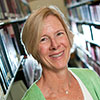This article is more than 5 years old.
I was excited for the opportunity to attend my first CNI meeting recently. The fact that it was held in San Antonio was a bonus! The meeting venue was a hotel right along the Riverwalk and the spring weather combined to make for a lovely 3 days.
Since I had never attended CNI before, I took advantage of the new attendee session to get the lay of the land. I learned that CNI has 200 member organization and it is funded entirely out of membership dues. It was founded in 1990 as a joint initiative between ARL and EDUCAUSE (maybe it was EDUCOM in those days?). It has moved past its original goal around mainstreaming the Internet and now addresses a broad range of of issues surrounding the use of those technologies in the more nuanced scholarly/teaching/learning landscape today. Its goals fall into 4 main categories – policy and advocacy; organization, preservation and management of content; the learning spaces needed and used by organizations and institutions; and technical issues (standards, infrastructure, bet practices). The framework of the semi-annual meetings is 2 plenary sessions with a full day of project briefings (presentations by members).
The first project briefing I attended was a presentation by Roger Schonfeld and Christine Wolff from Ithaka S+R. This is the group we will be working with to deploy a faculty survey this fall. They were reporting the results of their most recent (2015) national faculty survey. These results are what we will use to compare against our local results. The 2015 report had just been released that morning so the audience was very engaged in discussing the results. Key findings were:
- Discovery starting points remain in flux
- Interest in supporting students and their competencies and learning outcomes show signs of surging
- Faculty members prefer to be self-reliant in their data management and preservation processes
- There is no observable trend towards a format transition for monographs
- Traditional scholarly incentives continue to motivate behaviors around research and its dissemination
A session on the textbook revolution (Alison Armstrong, Ohio State; Steven Bell, Temple University; Kevin Stranack, Simon Fraser University) discussed the odd role that libraries have traditionally had in regard to textbooks on campuses but focused on how libraries can play a part in the issue of textbook affordability through campus partnerships. Check out the abstract and the presentation slides for more details.
Tuesday I focused on sessions that revolved around space. I got to hear about learning environments developed at Clemson Libraries – a learning commons opened in 2010, Brown Room (2013) and their Adobe Digital Studio. Their use of corporate partnerships was interesting to consider. I was very intrigued with their GIS augmented reality sandbox. Danianne Mizzy and Aiya Williams gave a presentation on Be a Maker @ UNC. Be a Maker is “a campus-wide network that nurtures making at UNC-Chapel Hill in support of teaching, learning, research, and innovation by providing educational initiatives that engage and blend diverse communities, including first generation college students, in experiential learning through design thinking and design processes.” I enjoyed learning the pedagogical goal – that learning happens best when learners construct their understanding through a process of constructing things to share with others. I was introduced to authorship learning. This framework helped me better understand the academic potential for makerspaces. The final space related session was a presentation by Alison Armstrong from Ohio State about their research commons that just opened at the beginning of 2016. The target users of this commons are advanced researchers. Since this is similar to ideas that we have been developing, I am hopeful we can find some valuable aspects to explore.
As you can see from some of my links, abstracts and presentations are available from the CNI site, so I plan to browse through them to see the gist of sessions I couldn’t attend. There was no shortage of good solid content and I was glad I had the chance to go.



3 Comments on ‘Susan @ CNI Spring Membership Meeting’
Susan, your description of the session on textbooks encouraged me the follow your link. I’m very interested in the library’s role in the open textbook movement! Thanks for posting!
Everything sounds applicable to our work here, how useful – and I love Ithaka S+R, I think they’re great research partners. Thanks for sharing!
I looked at the link to the textbook presentation too. It is encouraging that we have some paths to follow as we try to get some traction on this issue at WFU. There is quite a bit of relevant stuff at CNI!